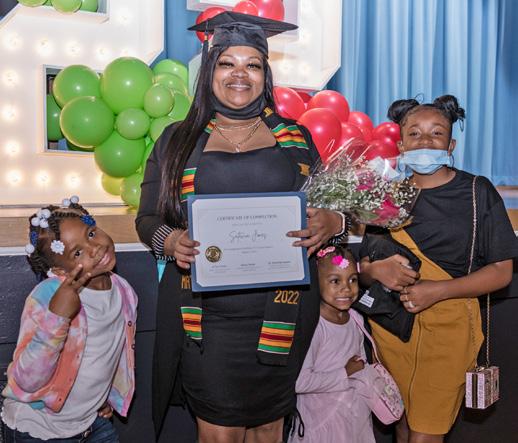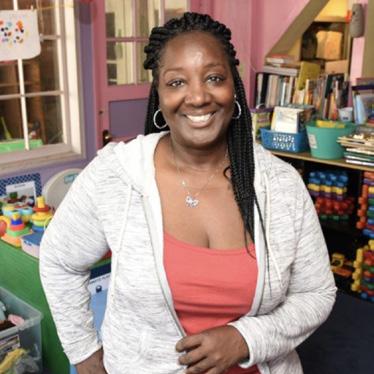Advancing San Francisco’s Black Children Through Quality Early Care & Education











 By
By
In early 2021, the San Francisco African American Early Childhood Educator Policy Council (AA ECE PC) was formed by Children’s Council at the behest of City and County of San Francisco’s Dream Keeper Initiative, as a stakeholder group to provide direct, current and personal experience with early childhood education (ECE). The twenty-two member council, comprised of local industry experts from a variety of ECE settings, met twice a month for eighteen months. They were tasked with providing insight, analysis and racial justice recommendations centered on improving student outcomes for Black1 children ages 0-5 while identifying the resources and tools to equip them to support this outcome. Additional research and examination included interviews, focus groups, collective interpretation and analysis from several experts with experience in a variety of ECE settings.
No challenge has been more daunting for our education sector than that of improving the kindergarten-readiness outcomes for children of color in San Francisco. Only 44% of Black children enter kindergarten in San Francisco Unified School District with the skills necessary to succeed in kindergarten, as compared to 70% of their White and Asian peers, and 38% of Latino peers2. Early education systems are not supporting our city’s Black children sufficiently.
90% of a child’s brain develops by the time they reach 6 years old3, and the quality of nurturing care a child receives during this time is critical to their future child development and kindergarten readiness. But, too many Black children face an uphill battle in this regard… quality early care and education can serve as a positive intervention that allows a child’s brain to overcome the stresses of poverty, hunger, violence, housing instability and economic racism4
1When
2https://www.first5sf.org/wp-content/uploads/2016/2015_school_readiness_report.pdf
3https://developingchild.harvard.edu/resources/inbrief-science-of-ecd/ 4https://centerforyouthwellness.org/health-impacts/

B/AA children who experience
First off, Black children in San Francisco don’t have the opportunity to see aspects of themselves reflected in their classroom teachers. Their self-esteem and vision of themselves is augmented by exposure to strong role models; all children benefit from experiencing diversity in their classrooms. Secondly, early educators largely lack access to training to be able to provide trauma-informed, culturally competent and anti-racist care that would support them as they care for Black children experiencing the effects of generational poverty and systemic racism5. One prominently understood correlation is that Black preschoolers are more likely to be suspended than their white peers6.
B/AA teacher as a young child
Many Black early educators are able to connect with the Black children in their classrooms because they themselves have lived experiences, and these lived experiences have a meaningful impact on Black children’s academic and social success because they often deeply understand Black children’s situations and their needs, often referred to as “The Role Model Effect”. Black children are able to see a mirror reflecting their own experiences and perspectives, and a window into their future. Investments into increasing the number of Black early educators is a step towards ensuring that our Black children – and all children – can benefit from the cultural knowledge and context that diverse educators bring to the classroom.
B/AA children who experience one B/AA teacher as a young child are 13% more likely
The value is clear when you look at the research. Black children who experience one Black teacher as a young child are 13% more likely to graduate from high school, and 19% more likely to enroll in college7
The problem is that while roughly 30% of children who qualify for public child care subsidies in San Francisco are Black8, only 7-9% of ECE professionals are Black9—a pattern played out in higher education students pursuing ECE credentials, as well. Therefore, lack of access to culturally competent, high-quality ECE is most deeply impacting our most vulnerable children, nearly a third of whom are Black.
Black children deserve better. For too long, the dream of quality education for this community has been elusive. Black children and families have been unfairly burdened with a history that includes the denial of education, separate and unequal education, and under-resourced schools (a byproduct of an inequitable property tax system). The strategies outlined in this report are long overdue. We know we can address this problem moving forward if we have the courage to disassemble the racist systems that propagate this inequity. When early educators are supported, children thrive. When early educators struggle, those struggles show up in the classroom.
BLACK CHILDREN WHO EXPERIENCE
BLACK TEACHER AS A YOUNG CHILD ARE
MORE LIKELY TO GRADUATE FROM HIGH SCHOOL, & 19%
MORE LIKELY TO ENROLL IN COLLEGE
5Milner, H.R. (2006). “The Promise of Black Teachers’ Success with Black Students”. Educational Foundations, Summer-Fall 2006. Kisida, Brian; Winters, Marcus A. (2015). “Representation in the Classroom: The Effect of Own-Race Teachers on Student Achievement”. Economics of Education Review... 6https://edsource.org/2021/why-california-needs-to-ban-preschool-suspensions-and-expulsions-experts-say/646049
7Gershenson, S. (2021). “The Long-Run Impacts of Same-Race Teachers”. National Bureau of Economic Research, February 2021, https://www.nber.org/papers/w25254. 8https://sfoece.org/wp-content/uploads/2018/08/Needs-Assessment-2017-FINAL.pdf
9https://sfoece.org/wp-content/uploads/2018/08/Needs-Assessment-2017-FINAL.pdf
What prevents equitable access to child development opportunities for Black children?
This report outlines a roadmap with three strategies and related recommendations focusing on recruiting and retaining Black early educators in San Francisco in order to improve learning outcomes for Black children.

Improve Early Childhood Educator career pathways, removing barriers to entry for the profession.
Improve compensation and financial sustainability for early educators.
Improve job satisfaction and efficacy so that Black Early Childhood Educators have the tools and resources to support Black children.

These priorities are mutually reinforcing. They must be addressed concurrently for real change to be evident.
As we look to find ways to increase school readiness for Black children, we must embrace these core strategies to get there. These strategies are also a critical component to recognizing and redressing the history of Black people’s lack of access to quality early care and education in the United States, and in San Francisco.

The San Francisco AA ECE PC concludes that solutions must address the overall inequity and must specifically focus on the inequities created by a legacy of racism—unapologetically directing supports to the Black community.
Early childhood education systems will fail to address disparities for Black children if the field continues to undervalue diversity in the definition of quality.
Responsible Transformation of the Early Childhood Education Workforce, Published by the National Black Child Development Institute, March 2020

Develop educational and career pathways that outline the benefits and resources available to help Black early educators gain credentials/licensing, career advancement, long-term security, living wages and benefits.
WHO: City Officials and local ECE Policy Makers, Colleges & Universities
Encourage those operating as FFN (Friends, Family, Neighbors) child care providers to become licensed professionals by marketing the benefits of pursuing a credential or license. Provide incentives to recruit and support this emerging workforce.
WHO: CBOs, City Officials, Policy Makers
Create a list of Black-owned and/or Black-operated ECE programs. List should articulate whether they receive government funding to accept children receiving public assistance. Track annual data on diversity and equity in the early childhood education workforce, collecting comprehensive data on race/ ethnicity, gender, compensation, access to professional development, technical assistance and coaching, and other indicators of equity.
Understanding the baseline of diversity in the workforce will allow us to better develop our workforce to reflect the diversity of the children. Such a list would enable Black families to choose to have an early educator that shares their race and/or culture.
WHO: City Officials, CBOs and Local ECE Policy Makers, Centers, FCCs
Fully develop and fund the Black ECE Career Pipeline Program that includes mentorship opportunities. Increase retention of newly entering ECE educators by supporting them in understanding ECE school climate and culture, while guiding them with curriculum, teaching strategies, family engagement and overall high quality ECE metrics aligned with the State’s QRIS system.
WHO: City Officials, Policy Makers, Philanthropy
Include credit for on-the-job experience in certification attainment by working with credentialing agencies and institutions to incorporate classroom and child care experience toward degrees and certificates. Develop standards for allowing experience to count as credit. Encourage partnerships between state and local education agencies, early educators and institutions of higher education to develop standards. Implement comprehensive outreach and marketing campaigns to ensure all educators are aware of opportunities for waivers of degree requirements based on experience level or credits toward degree completion based on competencies developed through experience.
WHO: LEAs, FCCs, Centers, CBOs, Policy Makers, Colleges
Fund the implementation of the Pilot Summer High School Vocational Black ECE Career Pipeline Program—a program to allow high schoolers an opportunity to explore the ECE field.
WHO: CBOs, City Officials, Policy Makers, Philanthropy
Fund the implementation of the Pilot SF Black ECE Fellows, a $50,000 investment per student to: obtain their degree, obtain continuing education, and work at a publicly-supported ECE center or FCC.
Provide scholarships and comprehensive supports for high schoolers entering the field.
To ensure equity in access to degree programs, comprehensive scholarship programs should be available to early educators committed to the early childhood education field. Comprehensive scholarships cover tuition, fees and books and provide stipends for other expenses such as travel to class and child care.
WHO: City Officials, Policy Makers, Philanthropy
Improve compensation and financial sustainability to ensure Black Early Childhood Educators teach in San Francisco
Develop an equitable, transparent wage scale that is comparable to SFUSD wages for job levels that include comparable educational attainment and work experience. Include equitable compensation for cultural competency on par with second language ability. Create clear salary scales that commensurate with experience and or degree and provide early childhood educators with resources to meet minimum salary requirements. Ensure educators required to meet the same education and licensing standards receive equitable salaries. Provide all licensed centers and FCC’s whose staff meet the bachelor’s degree requirement with funding to support minimum salary requirements.
WHO: City and State Policy Makers and Officials
Provide support for advocacy bodies by intentionally engaging Black educators to inform advocacy strategies. As with program and policy development, the voices of Black educators rarely inform advocacy strategies or campaigns in early childhood education.
Engage Black early educators to inform development and implementation of policies. Support trainings for early educators on how government and ECE systems operate and how they are funded. Ensure funding for both the AA ECE PC and AA ECE advocacy groups to develop specific implementation plans for policy reform efforts. Set recruitment and retention goals designed to maintain a workforce that reflects the diversity of the children served and monitor data accordingly. Assemble local commissions or taskforces on an annual basis to review data, assess the diversity needs of the field, and develop, maintain recruitment and retention strategies.
WHO: City Officials, Local Policy Makers, CBOs
(continued)
Provide healthcare and retirement benefits by creating a fund or endowment that will ensure all licensed child care center operators and early educators have short- and long-term benefits. Initially, a public investment would be required to create the fund. Those opting in would pay into the fund based on their wages.
WHO: CBOs, Centers, FCCs, Policy Makers, City Officials
Provide business assistance and support by funding a City-endorsed fiscal education and technical assistance program addressing topics such as contracts/agreements, billing, accounting, taxes and payroll.
WHO: City Officials, CBOs, Philanthropy
Establish and subsidize business support services that assist ECE business owners with business and back-office support such as billing, accounting, taxes and payroll – so that providers can reduce administrative burden.
WHO: City Officials, CBOs, Philanthropy
Improve job satisfaction and efficacy so that Black Early Childhood Educators have the tools and resources to support Black children
Fund a citywide pilot program to establish Family Navigator position(s) that utilize an Afrocentric Family Engagement Framework to support Black children, families and educators. This culturally competent, whole child/whole family tactic will help families going through tough times and needing extra support navigating the rich set of social services available to them citywide while also adding a bridge of services and support to the K-12 system.
WHO: City Officials, Policy Makers, Philanthropy
Fund a citywide pilot effort to ensure access to dedicated ECE Black Mental Health Professionals so that early educators have support from experts when helping children navigate challenging times.
WHO: City Officials, Policy Makers, Philanthropy
Advancing San Francisco’s Black Children Through Quality Early CareProvide Black children with supplemental educational opportunities that affirm their race, culture and identity, taught by African Americans, providing the critical opportunity for the Black child to have direct interaction with an adult educator who looks like them. For example, offering “Saturday School.”
WHO: CBOs, Centers, Policy Makers, City Officials
Fund business and fiscal education that teaches ECE-specific business skills such as required credentials, reporting obligations, industry-specific laws and regulations, as well as how to become profitable and sustain profitability.
WHO: City Officials, Policy Makers, Philanthropy
Provide early family information and education on the importance of 0-5-year education and socialization prior to entering the public school system – starting with pediatricians and doulas, leveraging those professionals who are trusted and who already have early interaction with Black families. Information might include how children are assessed upon entry into public school.
WHO: City Officials, Policy Makers, CBOs
In partnership with
